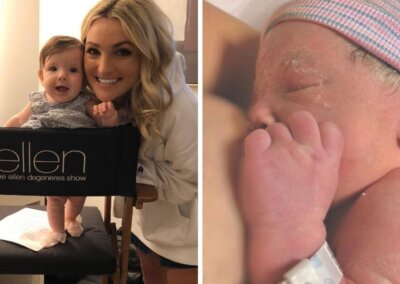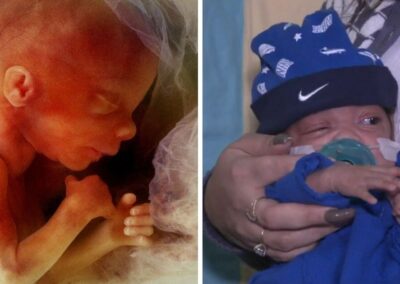A mother has criticised doctors who refused to give her care and said she should let her twin daughters die when she went into labour at 22 weeks.
Kayla Ibarra and her twin daughters, Luna and Ema, are now thriving at home with their older brother Noah and father Dardo.
One year on, revealing their story on her blog, the mother-of-three said the twins are “‘typical one-year-olds’ and no one would even know they were born 18 weeks premature.”
Kayla and Dardo were already parents to 18-month old Noah when they decided they would like to have another child. Both were delighted months later to find out they were expecting twin girls.
Kayla said the pregnancy felt “normal” until she noticed a small spot of blood when she went to the toilet. She called her midwife who recommended she went into hospital to make sure she didn’t have a bladder infection.
The pregnant mother rushed to hospital but had to wait four hours before seeing anyone because the nurses had “forgot” she was there.
When Kayla did eventually see a nurse, she was rushed into a backroom for a urine test and then called downstairs for an ultrasound.
When the urine test came back clean, the mother burst into tears because she “knew this was labour.”
She continued: “I started bawling my eyes out as I was finally wheeled to the ultrasound room.
“While getting the exam done, I kept telling the tech I was having contractions. She kept telling me to relax and all would be fine. I stood up and BAM, my water broke.”
Through tears a concerned Kayla asked, “what’s going to happen to my daughters?”.
As she was pushed in a wheelchair to an upstairs room of the hospital, a nurse responded, “the babies will be born today and they will die.”
By the time Kayla was taken back upstairs, her whole family was there waiting for her. They asked the nurse, “what do we do, what can we do?”.
However the nurse again said that “there is nothing that can be done, the twins will be born today and they will die.”
Realising they wouldn’t get the care or help Kayla and her family wanted for her twins, the family began to search for alternative hospitals with a neonatal intensive care unit (NICU) who would give her unborn twins a chance at life.
The family found a hospital in Ontario that was willing to help premature babies from 24 weeks, but her doctor refused to transfer Kayla to the new hospital and even refused to administer medication for her pain.
Furthermore, the doctor refused to allow Kayla to see her twins or hear their heartbeats dismissing the plea as a “waste of time,” instead saying “this [the labour] is going to be quick, let’s get it over with.'”
However, Kayla’s contractions stopped and her doctor agreed to let her rest.
Despite the fact her labour had stopped, a new doctor who had been assigned to Kayla urged her to deliver the twins the following morning through an induced labour.
However, knowing they wouldn’t intervene to save her twin girls, Kayla said: “I told him I refused to start labour again and as long as the twins are in me they are breathing and safe. He also denied me medication that would help the twins lung and brain develop.
Four days later, a shattered Kayla went into labour again at 22 weeks and two days – which was four days too early for the nearby hospital to intervene.
“I felt so defeated. I lost,” Kayla said.
Fortunately, a new doctor had been assigned to Kayla just as midwives were setting up the delivery room.
The doctor thought it was worth calling the hospital in Ontario who agreed to take the premature babies on.
Recalling the moment, Kayla said: “I felt hope. Finally, someone was going to just call and see. Within 15 minutes, he was back in my room coat on and said, ‘two hospitals agreed to take you… Soon, we were racing down the highway.”
Within hours, Kayla had given birth to Luna and Ema.
The twins barely weighed 1lb when they were born and spent a total of 115 days in the NICU, but they recovered remarkably well and were able to go home before their original due date.
Kayla said her twins have changed her life forever and she now wants the world to know premature babies can survive and can thrive.
“We went from a 0% chance of survival to celebrating over one year of life,” she added.

The survival rate for extremely premature babies in the UK has doubled over the past decade, prompting new guidance allowing doctors to try to save babies born as early as 22 weeks into a pregnancy – the age of Kayla’s now healthy and thriving twins.
The previous clinical guidance, drafted in 2008, included a presumption against attempting to provide life-saving treatment to a baby born before 23 weeks, on the basis it would not be in the child’s best interests.
In 2008 only two out of ten babies born alive at 23 weeks went on to survive. Today it is four out of ten, according to a new analysis from the British Association of Perinatal Medicine.
Furthermore, the majority of premature babies grow up to be healthy adults without any major health problems, a study revealed last year.
In a Facebook post post, Kayla recalled what a doctor said to her on day 65 of the girls’ NICU stay:
“The girls really have changed the way we view micropreemies here and in particular 22 weekers. It’s because of them that we have put certain protocols in place when dealing with micros and we have learned so much do’s and don’t’s from the girls. They have taught us so much and because of them, other 22 weekers will have the chance in our hospital. You did that, the girls did that.”
Right To Life UK spokesperson Catherine Robinson said:
“Stories of premature babies fighting and thriving, like Luna and Ema, along with recent new guidance and advances in medicine, showcase why this issue is one that Parliament should urgently revisit. It has been over a decade since time limits were last debated fully in Parliament in 2008.
“Independent polling from ComRes shows that 70% of women in the UK want to see the time limit for abortion reduced to 20 weeks or below. Our current abortion time limit is way out of line with the rest of Europe where the most common abortion time limit is 12 weeks.
“We support any change in law that would help lower abortion numbers and save the lives of babies in the womb.”












